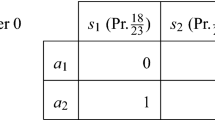Abstract
This paper examines conditions for Choquet expected utility (CEU) to satisfy both the reduction of two-stage acts and the recursion axioms, which are taken for granted in economics. A key idea of this paper is to consider nest-monotonic two-stage acts, which share their rankings of states with those of their reduced one-stage acts. Our main theorem shows that the axioms, one of which is restricted to nest-monotonic two-stage acts, and consequentialism are satisfied if and only if the preference is exponential CEU, which is such that the probability capacity is an exponential transformation of a probability measure. This result indicates that within a specified range of decision problems, exponential CEU is the only form of CEU that derives indifference to the timing of information resolution. Furthermore, the relation between first- and second-stage exponential CEU is characterized both by the f*-Bayesian updating rule and by comonotonic dynamic consistency. Conditions to establish the law of iterated expectation for CEU are also discussed.
Similar content being viewed by others
References
Dempster A.P.: Upper and lower probabilities induced by a multivalued map. Ann Math Stat 38, 325–339 (1967)
Dempster A.P.: A generalization of Bayesian inference. J R Stat Soc Ser B 30, 205–247 (1968)
Dominiak, A., Lefort, J.-P.: Unambiguous events and dynamic Choquet preferences. Econ Theory (2009). doi:10.1007/s00199-009-0512-7
Dow J.: Search decision with limited memory. Rev Econ Stud 58, 1–14 (1991)
Dow J., Werlang S.R.D.C.: Uncertainty aversion, risk aversion, and the optimal choice of portfolio. Econometrica 60, 197–204 (1993)
Dow J., Werlang S.R.D.C.: Nash equilibrium under Knightian uncertainty: breaking down backward induction. J Econ Theory 64, 305–324 (1994)
Eichberger J., Grant S., Kelsey D.: Updating Choquet beliefs. J Math Econ 43, 888–899 (2007)
Epstein L.G., LeBreton M.: Dynamically consistent beliefs must be Bayesian. J Econ Theory 61, 1–22 (1993)
Fishburn P.C.: The Foundations of Expected Utility. Reidel, Dordrecht (1982)
Ghirardato P.: Revisiting Savage in a conditional world. Econ Theory 20, 83–92 (2002)
Ghirardato P., Marinacci M.: Ambiguity made precise: a comparative foundation. J Econ Theory 102, 251–289 (2002)
Gilboa I.: Expected utility with purely subjective non-additive probabilities. J Math Econ 16, 65–88 (1987)
Gilboa I., Schmeidler D.: Maxmin expected utility with non-unique prior. J Math Econ 18, 141–153 (1989)
Gilboa I., Schmeidler D.: Updating ambiguous beliefs. J Econ Theory 59, 33–49 (1993)
Hammond P.: Consequentialist foundations for expected utility. Theory Decis 25, 25–78 (1988)
Hanany E., Klibanoff P.: Updating preferences with multiple priors. Theor Econ 2, 261–298 (2007)
Kahneman D., Tversky A.: Prospect theory: an analysis of decision under risk. Econometrica 47, 263–291 (1979)
Klibanoff P., Ozdenoren E.: Subjective recursive expected utility. Econ Theory 30, 49–87 (2007)
Kreps D.M., Porteus E.L.: Temporal resolution of uncertainty and dynamic choice theory. Econometrica 46, 185–200 (1978)
Machina M.J.: Dynamic consistency and non-expected utility models of choice under uncertainty. J Econ Lit 27, 1622–1668 (1989)
Machina M.J.: Risk, ambiguity, and the rank-dependence axioms. Am Econ Rev 99, 385–392 (2009)
Machina M.J., Schmeidler D.: A more robust definition of subjective probability. Econometrica 60, 745–780 (1992)
Meyer M.M.: Learning from coarse information: biased contests and career profiles. Rev Econ Stud 58, 15–41 (1991)
Mukerji S.: Ambiguity aversion and incompleteness of contractual form. Am Econ Rev 88, 1207–1232 (1998)
Pratt J.W.: Risk aversion in the small and in the large. Econometrica 88, 1207–1232 (1964)
Quiggin J.: A theory of anticipated utility. J Econ Behav Organ 3, 323–343 (1982)
Rubinstein A.: On price recognition and computational complexity in a monopolistic model. J Polit Econ 101, 473–484 (1993)
Sarin R., Wakker P.: A simple axiomatization of nonadditive expected utility. Econometrica 60, 1255–1272 (1992)
Sarin R., Wakker P.: Revealed likelihood and Knightian uncertainty. J Risk Uncertain 16, 223–250 (1998a)
Sarin R., Wakker P.: Dynamic choice and nonexpected utility. J Risk Uncertain 17, 87–119 (1998b)
Savage L.J.: The Foundation of Statistics. Wiley, New York (1954)
Schmeidler D.: Subjective probability and expected utility without additivity. Econometrica 57, 571–587 (1989)
Segal U.: The Ellsberg paradox and risk aversion: an anticipated utility approach. Int Econ Rev 28, 175–202 (1987)
Segal U.: Two-stage lotteries without the reduction axiom. Econometrica 58, 349–377 (1990)
Shafer G.: A Mathematical Theory of Evidence. Princeton University Press, Princeton (1976)
Yaari M.E.: The dual theory of choice under risk. Econometrica 55, 95–115 (1987)
Yoo K.-R.: The iterative law of expectation and non-additive probability measure. Econ Lett 37, 145–149 (1991)
Author information
Authors and Affiliations
Corresponding author
Additional information
An earlier version of this paper was entitled “The law of iterated Choquet expectation.” I thank Faruk Gul, Massimo Marinacci, Paolo Ghirardato, Hiroyuki Ozaki, Atsushi Kajii, Kiyohiko G. Nishimura, Hitoshi Matsushima, Michihiro Kandori, Kazuya Kamiya, Takashi Ui, Norio Takeoka, Satoru Takahashi, Takahiro Watanabe, and numerous seminar participants for helpful discussions and comments. I also thank an anonymous referee for valuable comments that have significantly improved the paper. I thank Dr. Paul Langman for assistance with English usage. This study was supported by a Grant-in-Aid for Scientific Research.
Rights and permissions
About this article
Cite this article
Koida, N. Nest-monotonic two-stage acts and exponential probability capacities. Econ Theory 50, 99–124 (2012). https://doi.org/10.1007/s00199-010-0551-0
Received:
Accepted:
Published:
Issue Date:
DOI: https://doi.org/10.1007/s00199-010-0551-0
Keywords
- Choquet expected utility
- Nest-monotonic two-stage act
- Exponential probability capacity
- Non-Bayesian updating
- Dynamic consistency
- Law of iterated expectation




